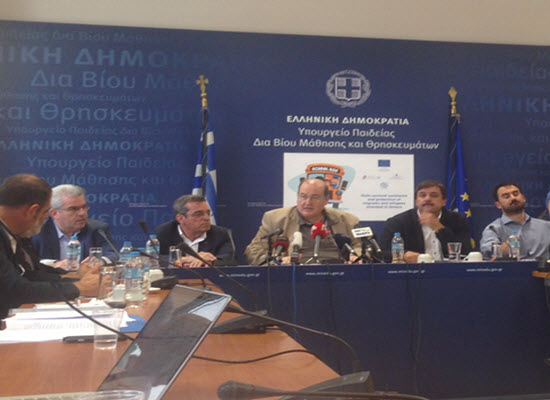05-10-16 International kudos as refugee education programme begins
Representatives of the European Commission, UNICEF, the UNHCR and the International Organisation for Migration were among the central international players in the refugee crisis who offered strong praise for the Government of Greece and the Greek people over a refugee education programme and the overall humanitarian reception of migrants. The kudos came at a major news conference today at which Education Minister Nikos Filis and ministry officials detailed the ambitious refugee children education programme that is beginning in less than a week.
Filis said that the core issue is that all children within Greece, including migrants with or without refugee status, have a right to education, both under the terms of the Greek constitution and international treaties. He underlined that negative reactions among certain communities and parents’ associations represent only a small, marginal minority, and noting that there are no internal borders in Greece, Filis said that the aim is to integrate refugee students with Greek students within months.
Noting that the government has had crucial assistance in handling a major humanitarian crisis, Filis thanked UNICEF, the UNHCR, the EU and other international organizations, municipalities, and the Church of Greece.
Ministry Secretary General Yannis Pantis explained the major efforts required for a team of university professors and other educators, with no financial remuneration, to draft a plan for the primary and secondary school education of migrants. He stressed that the whole process represented no financial burden on an educational system that has already suffered major budget cuts over the last years.
Pantis said that a total of 800 teachers will be hired for the migrant education programme, receiving specialised training in the teaching of Greek as a second language. The ministry is now issuing a second call for teachers of Greek as a second language and a call for the hiring of kindergarten teachers.
Extolling the cooperation of municipalities, Pantis said that 25 mayors in northern Greece held a coordination meeting with Thessaloniki Mayor Yannis Boutaris, and 10 mayors in the broader Attica region held a coordination meeting with Athens Mayor Yorgos Kaminis.
In these meetings the mayors agreed on the need to achieve an equitable distribution among municipalities of refugee and migrant students.
Health Minister Andreas offered “categorical “ assurances that the refugee and migrant children pose absolutely no public health threat, noting that a vaccination programme is in full swing, while the health ministry secretary general underlined that the vaccination of 90-95 percent of Greek school children already is a strong bulwark against any potential epidemiological dangers. He stressed that certain cases of infectious diseases at refugee camps were addressed immediately and effectively.
Xanthos said that the World Health Organization and the European Centre for Disease Protection and Control have assured that the Government of Greece has taken all necessary public health measures, and that the State School of Public Health and the Hellenic Centre for Disease Control and Prevention have assisted in completing a first round of mandatory vaccinations., with 37 percent of 22,000 youth having been vaccinated,
Deputy Development Minister Alexis Haritsis, who is competent for EU National Strategic Reference Framework Funding (NSRF), told the news conference how crucial EU funding has been for education, noting for example that 190 million euros have been earmarked for child day care centres, with 90,000 vouchers being issued.
In addition, 5,000 eight-month teacher hirings related to refugee education will occur by the end of the year. A seven million euro budget is earmarked for students up to the age of 15 (mandatory education).
European Commission representative Monika Ekstrom congratulated the Greek government for its mobilisation in handling the refugee crisis and refugee education, noting that Greece from the start has been at the frontline and that the Greek people have displayed solidarity, something that cannot be said of several other countries. A 2.8 million euro disbursement for school materials and technical assistance has been approved, with 10 million euros for the pilot programme to be disbursed by January 2017. Commissioner Stylianides has announced a 115 million euro programme, Ekstrom noted.

